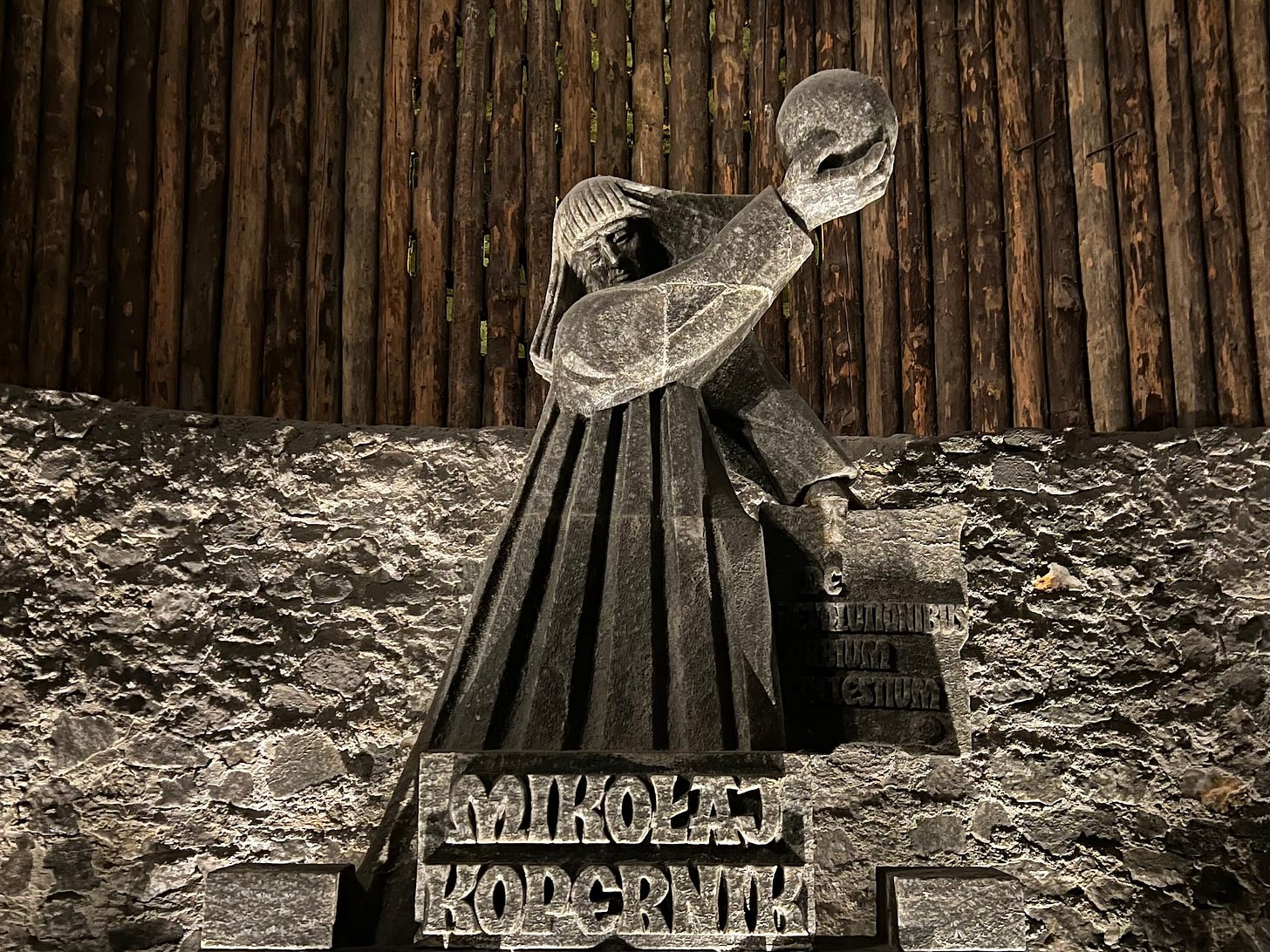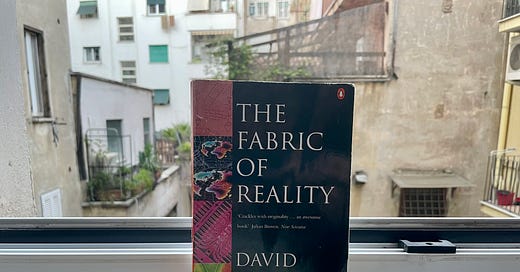In sharp contrast to my last post where I delved into the life and work of a famous medieval Catholic, in this post I review a book written by David Deutsch, a famous modern atheist.
In The Fabric of Reality, Deutsch takes four fundamentally important theories of contemporary science and weaves them together into a brilliant tapestry which illustrates our best understanding of what the universe really is.
Published in 1997, the book not only offers a relatively easy to grasp introduction to cutting edge scientific thought at the cusp of the millennium, but also provides a timeless and compelling defence of the scientific method and explains its significance in human culture. Reading Deutsch’s book reminded me why I am studying a science degree and further fuelled my passion for the scientific method. I loved this book.
Deutsch begins the book by recounting a childhood memory of his. He was told that in ancient civilisations the collection of human knowledge was so limited, that it was possible for an educated person to know everything that was known. A thrilling thought. However, he further recounts being told that a comprehensive set of knowledge like this was no longer attainable, because of the seemingly unlimited generation of information in modern times. Not so thrilling.
This early conversation, Deutsch says, was what led him to become a scientist. As he delved deeper into the scientific method and the philosophy of science underpinning it, he grew convinced that fundamental scientific theories could empower an individual to almost wholly comprehend reality, like an upgraded version of the educated individuals in ancient civilisations.
Deutsch’s introduction resonated with me. Like him, I’ve always been driven by an innate curiosity to understand the world and as a child I did not like being told that there are limits to knowledge. I was not raised to be a budding scientist however, instead I was taught to find answers through spirituality – such contemplation filled me with awe and wonder, but I never felt like I had a deep understanding of reality. An earlier introduction to philosophy of science could have helped me move forward, but unfortunately, because of the poor way science was taught to me at school, I mistakenly viewed science as merely an archive of known facts.
What I enjoyed about this book so much, was its portrayal of science as a quest to both confront and grapple with the unknown. While this portrayal might seem obvious to anyone familiar with even basic philosophy of science, Deutsch explains the scientific method in a beautiful way that gave me the same sense of awe and wonder I once felt through spiritual contemplation of the unknown as a child. I hadn’t felt this feeling for a long time.
As I’ve moved myself onward from religion, I’ve occasionally feared relinquishing the exploration of the unknown. But this book made me realise this fear is unfounded – through science, one can venture into the unknown without resorting to superstition or mysticism. I respect that everyone has the right to their own approach to deciphering the mysteries of the universe, but in this book Deutsch presents a compelling case for championing the scientific method as the penultimate approach. Let’s dive into the book in greater detail.
Weaving a Tapestry
As a torch moves further from the human eye, the light from the torch appears dimmer. But for a frog, the light instead appears as less regular flashes of light, all at the same level of intensity. If you point a torch at a frog that is one hundred million kilometres away, the frog will see on average one flicker per day, but this flicker will be as bright as it would see at any other distance.
I hope this note about how frogs experience light is interesting enough to make you consider reading about the properties of individual photons. Experiments involving individual protons provide a good jumping off point for learning about quantum physics and Deutsch goes over them in great detail. The double-slit experiment is the best one to learn about if you are getting started. I got a handle on quantum physics properly for the first time thanks to reading about this experiment.
Quantum theory is the first (and least approachable, getting the hard things out of the way first) of four threads which Deutsch writes about in his book, the other three being Dawkins’ version of the theory of evolution by natural selection, Turing’s theory of computation, and Karl Popper’s philosophy of knowledge. The reason Deutsch calls these threads is that he does not believe that they are isolated scientific concepts. Instead, he claims that they're deeply interconnected, forming the fabric of our reality (hence the name of the book). This claim and its consequences are going to be the main focus of my post. Unfortunately, explaining the four theories is beyond the scope of this post, but hopefully by the end of reading this you will feel inspired to go and learn about them yourself if you haven’t already.
Take Scientific Theories Seriously
Instrumentalism is the view that scientific theories merely provide useful predictions about the future and do not actually explain reality. Deutsch does not share this view and instead champions scientific realism, asserting that scientific theories genuinely do explain reality.
To illustrate the difference, take the following example. An instrumentalist might say, “When I place plants in sunlight, they grow faster. That’s all I need to know, I don’t need to know how or why.” In contrast, a scientific realist would delve into the intricacies of photosynthesis. And while an instrumentalist might leverage the theory of photosynthesis for further practical purposes, a scientific realist values the knowledge intrinsically regardless of any “practical purposes”, believing that they’ve unearthed a foundational truth about the reality of plant life.
Deutsch wants people to not only have an appreciation for the practical usefulness of scientific findings, but to consider them more seriously as descriptions of reality itself. An instrumentalist lens can obscure the profound philosophical ramifications of scientific research, potentially stalling both human and scientific advancement. This is particularly evident when findings challenge established beliefs or common sense. He cites the lack of understanding of quantum theory amongst most people as a modern case in point.
Reflecting on this, it occurred to me that until I was forced to do so by a university course I took, I had never bothered to learn about quantum physics. Though I consider myself someone interested in the cutting edge, I had neglected quantum physics for exactly the reasons that Deutsch describes. The theories are belittled in popular culture as too hard to understand, or even nonsensical. In popular culture we also make jokes about how people in the past were stupid for ignoring scientific theories that claimed that the world was not at the centre of the universe, or round, etc. But that isn’t any different from the modern contempt for quantum theory!
Sometimes we think that we live in an enlightened era, but scientists still seem to have a very hard time. Acceptance of groundbreaking scientific theories is still too slow a process. In recent years we have even dealt with a resurgence of theories arguing that the earth is flat. It’s crucial to recognise that controversy or departure from common sense doesn’t diminish a theory’s validity. Theories like quantum mechanics only supersede their predecessors because of their superior explanatory power.
Deutsch explains why we can claim that scientific theories improve over time as follows:
“There are objective differences [between past and present theories]. We can fly, whereas for most of human history people could only dream of this. The ancients would not have been blind to the efficacy of our flying machines just because, within their paradigm, they could not conceive of how they work. The reason why we can fly is that we understand what is really out there well enough to build flying machines. The reason why the ancients could not is that their understanding was objectively inferior to ours.”
Martyrs of Science
Many religions venerate their martyrs – followers of faith who chose death over denouncement of their spiritual beliefs. The tales of these martyrs both attract new followers and give pause to existing ones when they consider leaving the faith. After all, if the religious claims are baseless, why would people have sacrificed their lives defending them? I have certainly found these stories emotionally compelling in my own life.
Further, Christians are told that religious faith doesn't guarantee an easy life for followers. Instead, Christians are warned that faith will most likely attract criticism and persecution of a severity that can even lead to death. A concerning consequence of this doctrine is that Christians might interpret any critique of their faith as foretold persecution. This can create a self-reinforcing cycle, pushing some towards radicalisation.
In reality, people are persecuted for all types of beliefs, both religious and irreligious. It is a miscalculation to attribute persecution as a sign that one is carrying favour with a supreme being. Deutsch’s exploration of scientific history underscores this. Many pioneering scientists faced persecution akin to religious martyrs. Yet, what distinguishes these scientists from their Christian counterparts is the enduring validity of their theories, even after intense scrutiny. For instance, if the Earth were truly stationary and central in the universe, Galileo’s persecution would probably have been long forgotten.

Remarkably, the four scientists who founded the scientific theories which make up the four threads explored in Deutsche’s book found their lives taken over by the need to defend their theories against obsolete ones for much of their professional life after announcing their groundbreaking discoveries. As mentioned in the book:
“The debate between Karl Popper and most of his critics was effectively about the problem of induction [a solved problem according to Deutsche]. Turing spent the last years of his life in effect defending the proposition that human brains do not operate by supernatural means. Everett [one of many pioneers of quantum theory] left scientific research after making no headway with his multiverse theory [and died before his theories gained pragmatic acceptance.] And finally, Dawkins has somehow become the public defender of scientific rationality against, of all things, creationism, and more generally a pre-scientific worldview that has been obsolete since Galileo.”
It is sad that in the modern era, we still drag our brightest minds down. Deutsche asks us to imagine – what could these legends of science have gotten up to if they had been able to continue working on new theories instead of defending their existing ones against nonsense?
New Atheism
Reflecting on Deutsche’s impassioned plea that we take scientists seriously threw me back to the fiery debates and dialogues of the “New Atheists” from the 2000s. Given that Deutsch wrote The Fabric of Reality in 1997, was an Oxford professor and good friend of Dawkins – a central figure in the New Atheism movement – this connection isn't surprising.
When I first watched these atheists as a teenager, I found them needlessly abrasive and felt that they were missing the point of religion. However, two years into my science degree and having read this and other books about philosophy of science, my perspective has broadened. Where I used to see abrasiveness, I now see frustration and I increasingly share this frustration. This feeling is rarely directed at religious thought specifically, but instead more generally at the constant barrage of nonsense and poor reasoning found in current public discourse. The growing level of interest in baseless conspiracy theories in today’s society, especially among those who should know better, is particularly upsetting.
On a brighter note, in my own country Australia, since the New Atheism movement, there has been a clear shift away from mysticism and superstition in public life. Demonstrating this change, I recently revisited a recording of a ten year old debate between Richard Dawkins and George Pell, who was Australia’s highest ranking Catholic at the time. Though only a decade old, the debate feels like a relic from a bygone era – it is a truly fascinating (albeit sometimes frustrating) watch.
With only the foundational knowledge from my two years of science studies and some reading I have done in my own time, the flaws in Pell’s stance on metaphysics are starkly evident. The audience’s reactions, applauding Pell’s baseless assertions, seem positively alien in today’s more enlightened context. I highly recommend giving it a watch – amidst the noise of modern life, viewing was a happy reminder of how social views are slowly but surely evolving for the better.

All that being said, on a personal note, I’ve recently arrived in Rome and will begin studying at a Vatican affiliated university this month. My goal is to rigorously examine Catholic philosophy, armed with the fresh insights I've learned over recent years. I am not one to enjoy being in an echo chamber and I think studying here will be a deeply personal experience and a good intellectual challenge. However, I suspect that if I want to avoid becoming like Dawkins in the aforementioned debate, I will need a lot of patience and restraint. Please wish me luck!
John.





